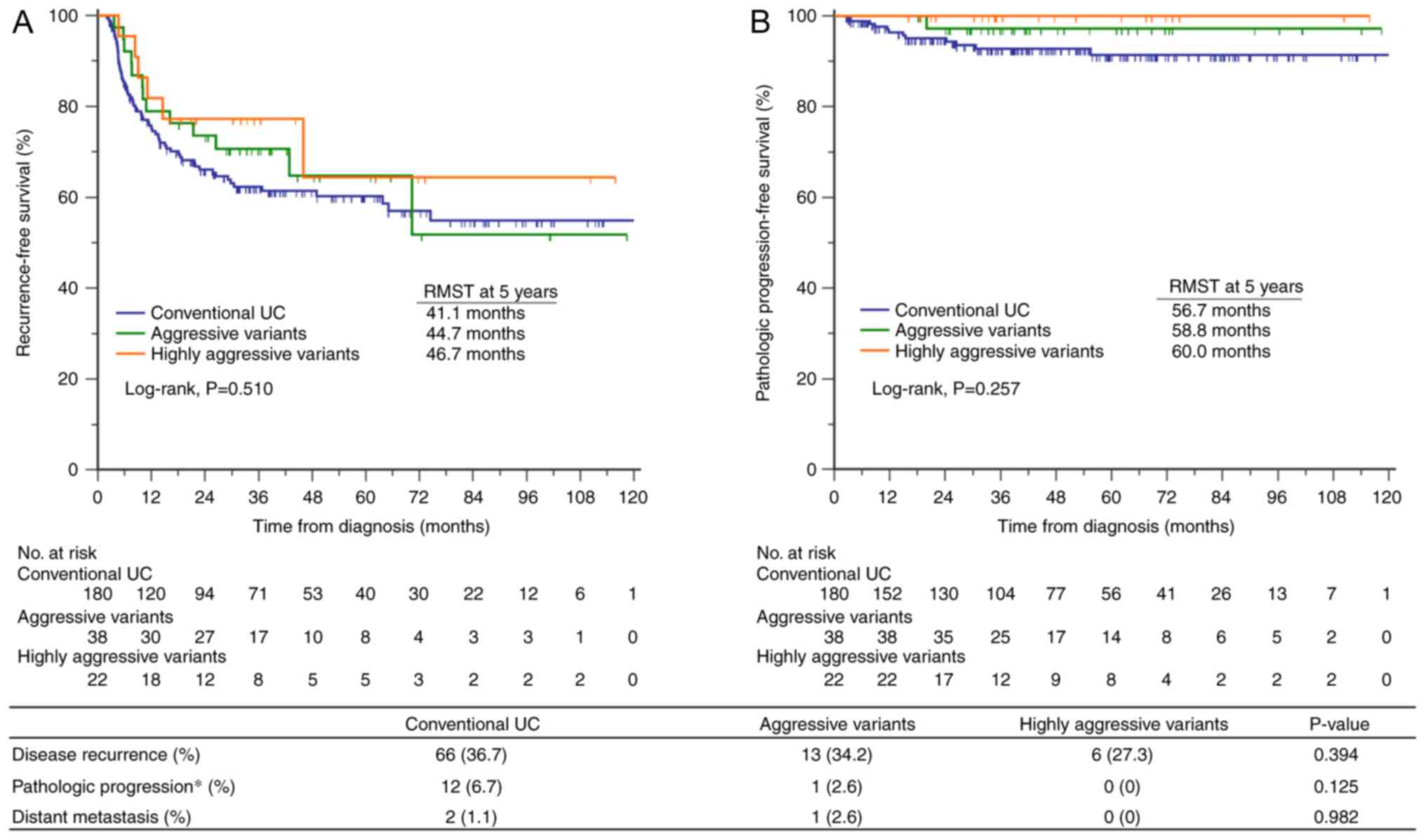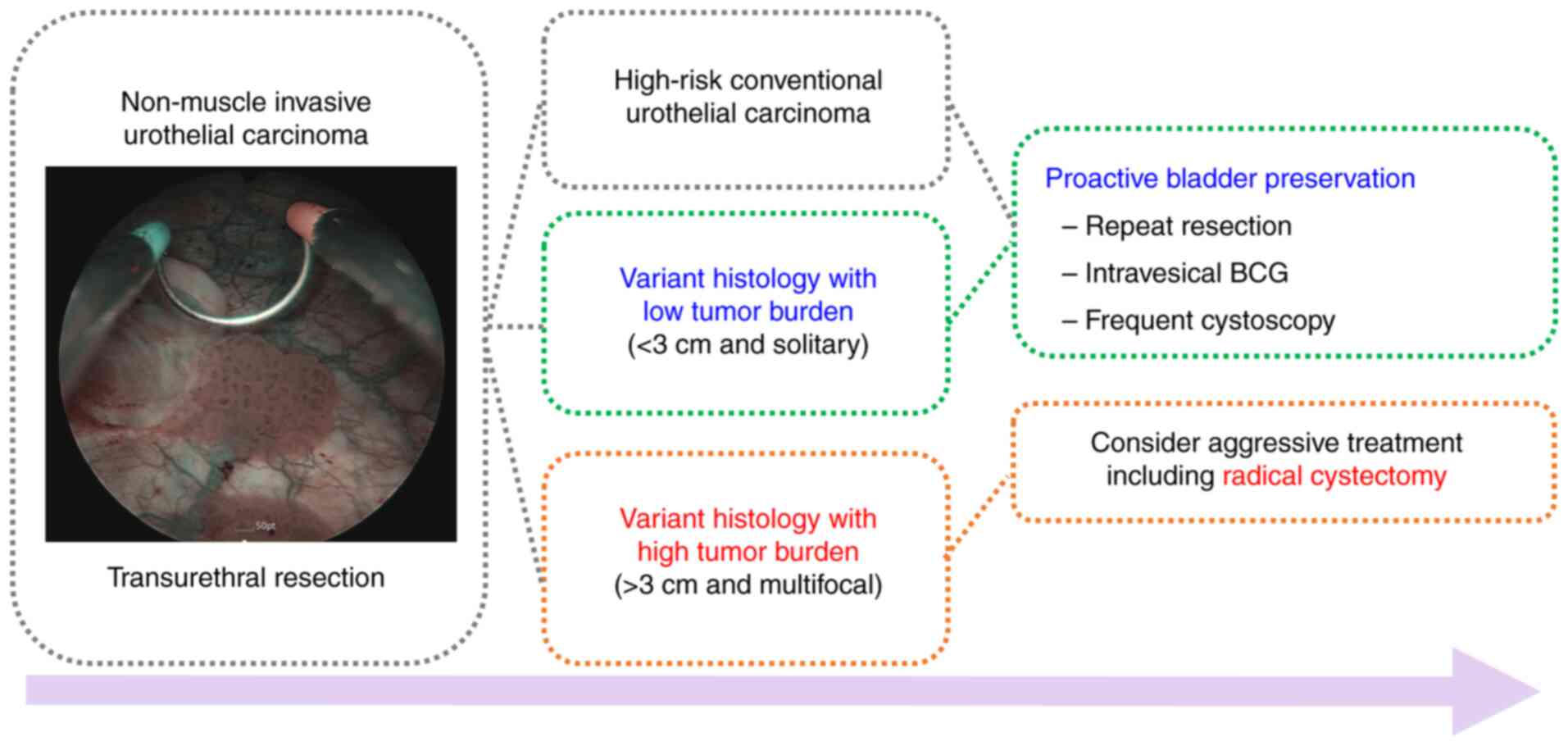|
1
|
Sung H, Ferlay J, Siegel RL, Laversanne M,
Soerjomataram I, Jemal A and Bray F: Global Cancer Statistics 2020:
GLOBOCAN Estimates of Incidence and Mortality Worldwide for 36
Cancers in 185 Countries. CA Cancer J Clin. 71:209–249.
2021.PubMed/NCBI View Article : Google Scholar
|
|
2
|
Nielsen ME, Smith AB, Meyer AM, Kuo TM,
Tyree S, Kim WY, Milowsky MI, Pruthi RS and Millikan RC: Trends in
stage-specific incidence rates for urothelial carcinoma of the
bladder in the United States: 1988 to 2006. Cancer. 120:86–95.
2014.PubMed/NCBI View Article : Google Scholar
|
|
3
|
Lenis AT, Lec PM, Chamie K and Mshs MD:
Bladder Cancer: A Review. JAMA. 324:1980–1991. 2020.PubMed/NCBI View Article : Google Scholar
|
|
4
|
Lopez-Beltran A, Henriques V, Montironi R,
Cimadamore A, Raspollini MR and Cheng L: Variants and new entities
of bladder cancer. Histopathology. 74:77–96. 2019.PubMed/NCBI View Article : Google Scholar
|
|
5
|
Lonati C, Baumeister P, Ornaghi PI, Di
Trapani E, De Cobelli O, Rink M, Karnes RJ, Poyet C, Simone G,
Afferi L, et al: Accuracy of transurethral resection of the bladder
in detecting variant histology of bladder cancer compared with
radical cystectomy. Eur Urol Focus. 8:457–464. 2022.PubMed/NCBI View Article : Google Scholar
|
|
6
|
Humphrey PA, Moch H, Cubilla AL, Ulbright
TM and Reuter VE: The 2016 WHO Classification of tumours of the
urinary system and male genital Organs-Part B: Prostate and bladder
tumours. Eur Urol. 70:106–119. 2016.PubMed/NCBI View Article : Google Scholar
|
|
7
|
Koguchi D, Matsumoto K, Ikeda M, Taoka Y,
Hirayama T, Murakami Y, Utsunomiya T, Matsuda D, Okuno N, Irie A
and Iwamura M: Histologic variants associated with biological
aggressiveness and poor prognosis in patients treated with radical
cystectomy. Jpn J Clin Oncol. 49:373–378. 2019.PubMed/NCBI View Article : Google Scholar
|
|
8
|
Stroman L, Nair R, Russell B, Malik N,
Desai A, Chandra A, Thurairaja R, Dasgupta P, Khan MS and Malde S:
The impact of non-urothelial variant histology on oncological
outcomes following radical cystectomy. BJU Int. 124:418–423.
2019.PubMed/NCBI View Article : Google Scholar
|
|
9
|
Mori K, Abufaraj M, Mostafaei H, Quhal F,
Karakiewicz PI, Briganti A, Kimura S, Egawa S and Shariat SF: A
systematic review and meta-analysis of variant histology in
urothelial carcinoma of the bladder treated with radical
cystectomy. J Urol. 204:1129–1140. 2020.PubMed/NCBI View Article : Google Scholar
|
|
10
|
Shapur NK, Katz R, Pode D, Shapiro A,
Yutkin V, Pizov G, Appelbaum L, Zorn KC, Duvdevani M, Landau EH and
Gofrit ON: Is radical cystectomy mandatory in every patient with
variant histology of bladder cancer. Rare Tumors.
3(e22)2011.PubMed/NCBI View Article : Google Scholar
|
|
11
|
Gofrit ON, Yutkin V, Shapiro A, Pizov G,
Zorn KC, Hidas G, Gielchinsky I, Duvdevani M, Landau EH and Pode D:
The response of variant histology bladder cancer to intravesical
immunotherapy compared to conventional cancer. Front Oncol.
6(43)2016.PubMed/NCBI View Article : Google Scholar
|
|
12
|
Fujii N, Hoshii Y, Hirata H, Mori J,
Shimizu K, Kobayashi K, Kawai Y, Inoue R, Yamamoto Y, Matsumoto H,
et al: Impact of divergent differentiation in urothelial carcinoma
on oncological outcome in patients with T1 high-grade bladder
cancer. Jpn J Clin Oncol. 47:560–567. 2017.PubMed/NCBI View Article : Google Scholar
|
|
13
|
Xu H, Xie L, Liu X, Zhang Y, Shen Z, Chen
T, Qiu X, Sha N, Xing C, Wu Z, et al: Impact of squamous and/or
glandular differentiation on recurrence and progression following
transurethral resection for non-muscle invasive urothelial
carcinoma of bladder. Oncol Lett. 14:3522–3528. 2017.PubMed/NCBI View Article : Google Scholar
|
|
14
|
Li G, Hu J and Niu Y: Squamous
differentiation in pT1 bladder urothelial carcinoma predicts poor
response for intravesical chemotherapy. Oncotarget. 9:217–223.
2018.PubMed/NCBI View Article : Google Scholar
|
|
15
|
Zhao G, Wang C, Tang Y, Liu X, Liu Z, Li G
and Mei Y: Glandular differentiation in pT1 urothelial carcinoma of
bladder predicts poor prognosis. Sci Rep. 9(5323)2019.PubMed/NCBI View Article : Google Scholar
|
|
16
|
Sangoi AR, Cox RM, Higgins JP, Quick CM
and McKenney JK: Non-invasive papillary urothelial carcinoma with
‘micropapillary’ architecture: Clinicopathological study of 18
patients emphasising clinical outcomes. Histopathology. 77:728–733.
2020.PubMed/NCBI View Article : Google Scholar
|
|
17
|
Kamat AM, Gee JR, Dinney CP, Grossman HB,
Swanson DA, Millikan RE, Detry MA, Robinson TL and Pisters LL: The
case for early cystectomy in the treatment of nonmuscle invasive
micropapillary bladder carcinoma. J Urol. 175:881–885.
2006.PubMed/NCBI View Article : Google Scholar
|
|
18
|
Ghoneim IA, Miocinovic R, Stephenson AJ,
Garcia JA, Gong MC, Campbell SC, Hansel DE and Fergany AF:
Neoadjuvant systemic therapy or early cystectomy? Single-center
analysis of outcomes after therapy for patients with clinically
localized micropapillary urothelial carcinoma of the bladder.
Urology. 77:867–870. 2011.PubMed/NCBI View Article : Google Scholar
|
|
19
|
Spaliviero M, Dalbagni G, Bochner BH, Poon
BY, Huang H, Al-Ahmadie HA, Donahue TF, Taylor JM, Meeks JJ,
Sjoberg DD, et al: Clinical outcome of patients with T1
micropapillary urothelial carcinoma of the bladder. J Urol.
192:702–707. 2014.PubMed/NCBI View Article : Google Scholar
|
|
20
|
Willis DL, Fernandez MI, Dickstein RJ,
Parikh S, Shah JB, Pisters LL, Guo CC, Henderson S, Czerniak BA,
Grossman HB, et al: Clinical outcomes of cT1 micropapillary bladder
cancer. J Urol. 193:1129–1134. 2015.PubMed/NCBI View Article : Google Scholar
|
|
21
|
Mally AD, Tin AL, Lee JK, Satasivam P, Cha
EK, Donat SM, Herr HW, Bochner BH, Sjoberg DD and Dalbagni G:
Clinical outcomes of patients with T1 nested variant of urothelial
carcinoma compared to pure urothelial carcinoma of the bladder.
Clin Genitourin Cancer: Jul 14, 2017 doi:
10.1016/j.clgc.2017.07.002 (Epub ahead of print).
|
|
22
|
Lopez-Beltran A, Blanca A, Cimadamore A,
Montironi R, Luque RJ, Volavšek M and Cheng L: T1 bladder carcinoma
with variant histology: Pathological features and clinical
significance. Virchows Arch. 480:989–998. 2022.PubMed/NCBI View Article : Google Scholar
|
|
23
|
Chang SS, Boorjian SA, Chou R, Clark PE,
Daneshmand S, Konety BR, Pruthi R, Quale DZ, Ritch CR, Seigne JD,
et al: Diagnosis and treatment of Non-Muscle invasive bladder
cancer: AUA/SUO guideline. J Urol. 196:1021–1029. 2016.PubMed/NCBI View Article : Google Scholar
|
|
24
|
Flaig TW, Spiess PE, Abern M, Agarwal N,
Bangs R, Boorjian SA, Buyyounouski MK, Chan K, Chang S, Friedlander
T, et al: NCCN Guidelines® Insights: Bladder Cancer, Version
2.2022. J Natl Compr Canc Netw. 20:866–878. 2022.PubMed/NCBI View Article : Google Scholar
|
|
25
|
Seisen T, Compérat E, Léon P and Roupret
M: Impact of histological variants on the outcomes of nonmuscle
invasive bladder cancer after transurethral resection. Curr Opin
Urol. 24:524–531. 2014.PubMed/NCBI View Article : Google Scholar
|
|
26
|
Ho D, Imai K, King G and Stuart EA:
MatchIt: Nonparametric Preprocessing for Parametric Causal
Inference. J Statistical Software. 42:1–28. 2011.
|
|
27
|
Austin PC: A comparison of 12 algorithms
for matching on the propensity score. Stat Med. 33:1057–1069.
2014.PubMed/NCBI View
Article : Google Scholar
|
|
28
|
Montironi R and Lopez-Beltran A: The 2004
WHO classification of bladder tumors: A summary and commentary. Int
J Surg Pathol. 13:143–153. 2005.PubMed/NCBI View Article : Google Scholar
|
|
29
|
Edge SB and Compton CC: The American Joint
Committee on Cancer: The 7th edition of the AJCC cancer staging
manual and the future of TNM. Ann Surg Oncol. 17:1471–1474.
2010.PubMed/NCBI View Article : Google Scholar
|
|
30
|
Amin MB, Greene FL, Edge SB, Compton CC,
Gershenwald JE, Brookland RK, Meyer L, Gress DM, Byrd DR and
Winchester DP: The Eighth Edition AJCC Cancer Staging Manual:
Continuing to build a bridge from a population-based to a more
‘personalized’ approach to cancer staging. CA Cancer J Clin.
67:93–99. 2017.PubMed/NCBI View Article : Google Scholar
|
|
31
|
Lopez-Beltran A and Cheng L: Histologic
variants of urothelial carcinoma: Differential diagnosis and
clinical implications. Hum Pathol. 37:1371–1388. 2006.PubMed/NCBI View Article : Google Scholar
|
|
32
|
Babjuk M, Burger M, Capoun O, Cohen D,
Compérat EM, Dominguez Escrig JL, Gontero P, Liedberg F,
Masson-Lecomte A, Mostafid AH, et al: European association of
urology guidelines on Non-muscle-invasive bladder cancer (Ta, T1,
and carcinoma in situ). Eur Urol. 81:75–94. 2022.PubMed/NCBI View Article : Google Scholar
|
|
33
|
Sanguedolce F, Calò B, Mancini V, Zanelli
M, Palicelli A, Zizzo M, Ascani S, Carrieri G and Cormio L:
Non-Muscle invasive bladder cancer with variant histology:
Biological features and clinical implications. Oncology.
99:345–358. 2021.PubMed/NCBI View Article : Google Scholar
|
|
34
|
Kamat AM, Dinney CP, Gee JR, Grossman HB,
Siefker-Radtke AO, Tamboli P, Detry MA, Robinson TL and Pisters LL:
Micropapillary bladder cancer: A review of the University of Texas
M. D. Anderson Cancer Center experience with 100 consecutive
patients. Cancer. 110:62–67. 2007.PubMed/NCBI View Article : Google Scholar
|
|
35
|
Wright JL, Black PC, Brown GA, Porter MP,
Kamat AM, Dinney CP and Lin DW: Differences in survival among
patients with sarcomatoid carcinoma, carcinosarcoma and urothelial
carcinoma of the bladder. J Urol. 178:2302–2307. 2007.PubMed/NCBI View Article : Google Scholar
|
|
36
|
Li G, Song H, Wang J, Bao Y and Niu Y:
Poor prognostic value of lymphovascular invasion for pT1 urothelial
carcinoma with squamous differentiation in bladder cancer. Sci Rep.
6(27586)2016.PubMed/NCBI View Article : Google Scholar
|
|
37
|
Yorozuya W, Nishiyama N, Shindo T, Kyoda
Y, Itoh N, Sugita S, Hasegawa T and Masumori N: Bacillus
Calmette-Guérin may have clinical benefit for glandular or squamous
differentiation in non-muscle invasive bladder cancer patients:
Retrospective multicenter study. Jpn J Clin Oncol. 48:661–666.
2018.PubMed/NCBI View Article : Google Scholar
|
|
38
|
Suh J, Moon KC, Jung JH, Lee J, Song WH,
Kang YJ, Jeong CW, Kwak C, Kim HH and Ku JH: BCG instillation
versus radical cystectomy for high-risk NMIBC with
squamous/glandular histologic variants. Sci Rep.
9(15268)2019.PubMed/NCBI View Article : Google Scholar
|
|
39
|
Lobo N, Shariat SF, Guo CC, Fernandez MI,
Kassouf W, Choudhury A, Gao J, Williams SB, Galsky MD, Taylor JA
III, et al: What Is the significance of variant histology in
urothelial carcinoma? Eur Urol Focus. 6:653–663. 2020.PubMed/NCBI View Article : Google Scholar
|
















